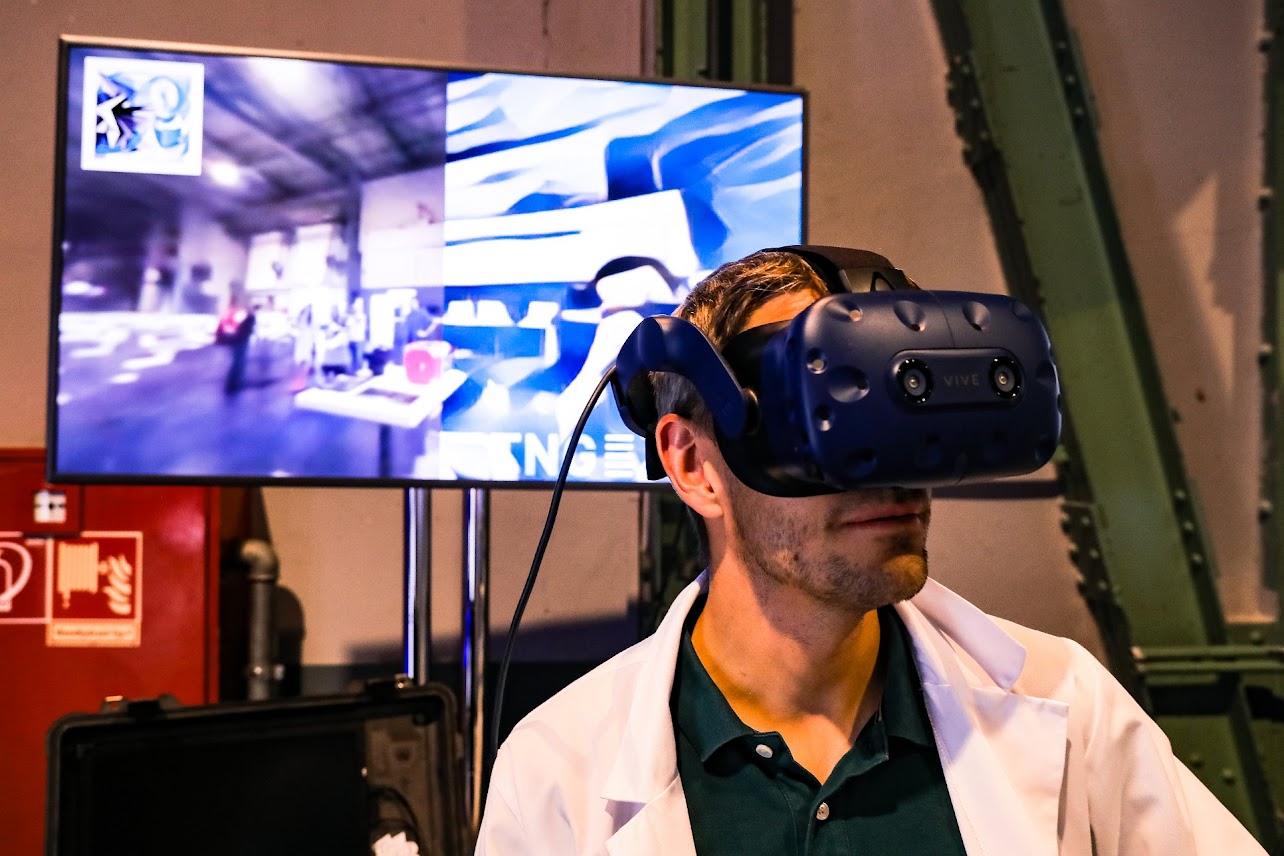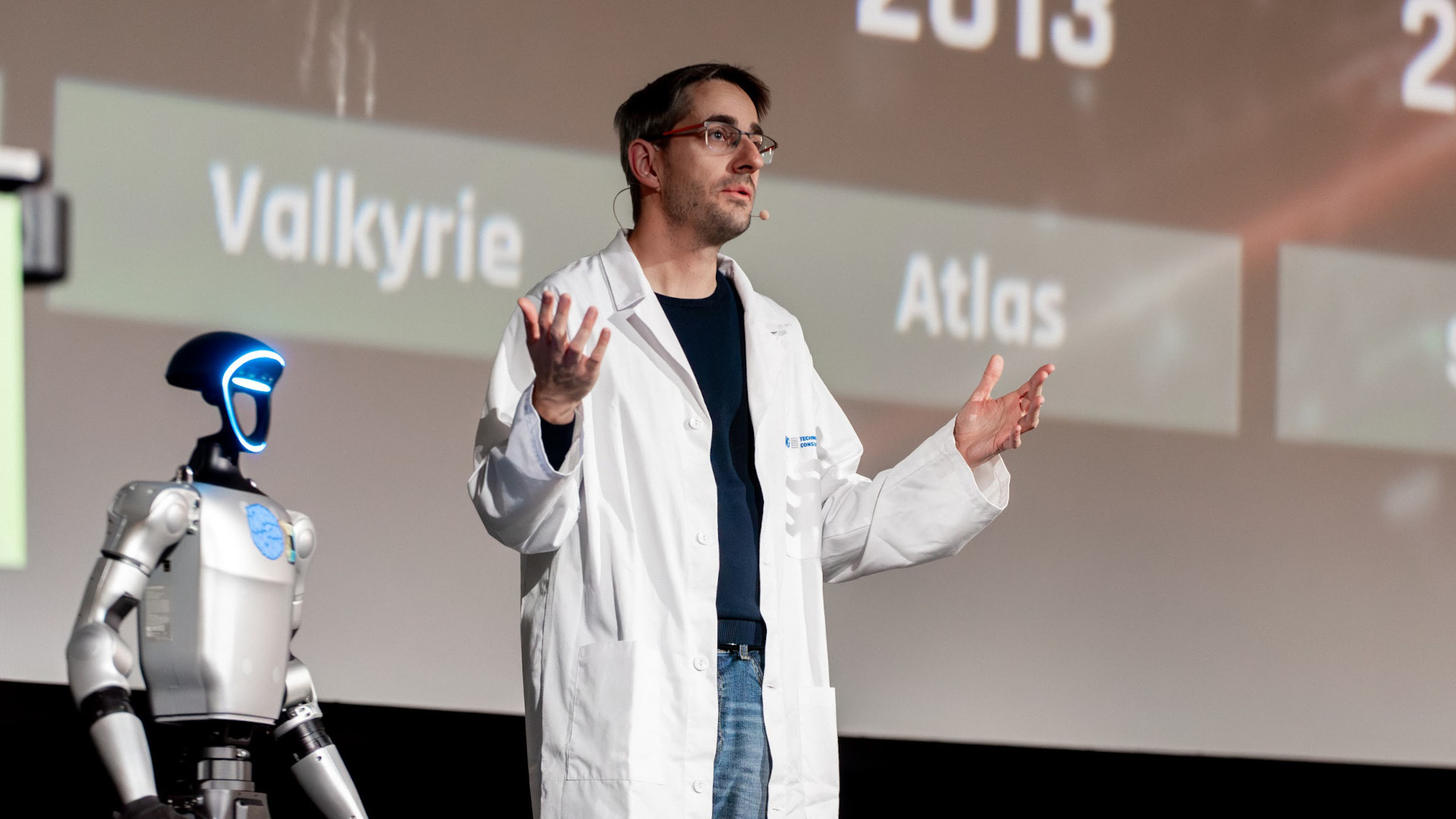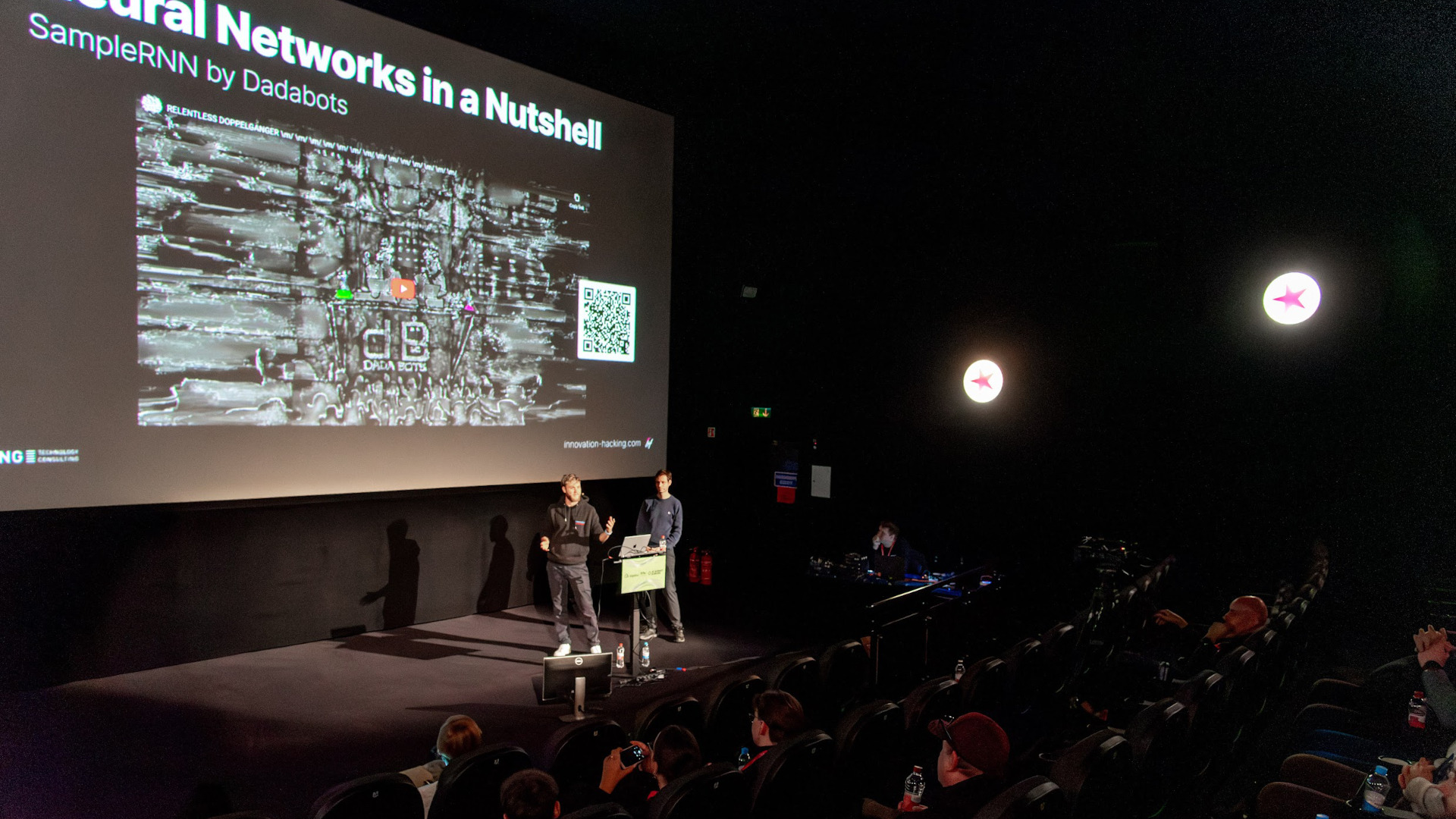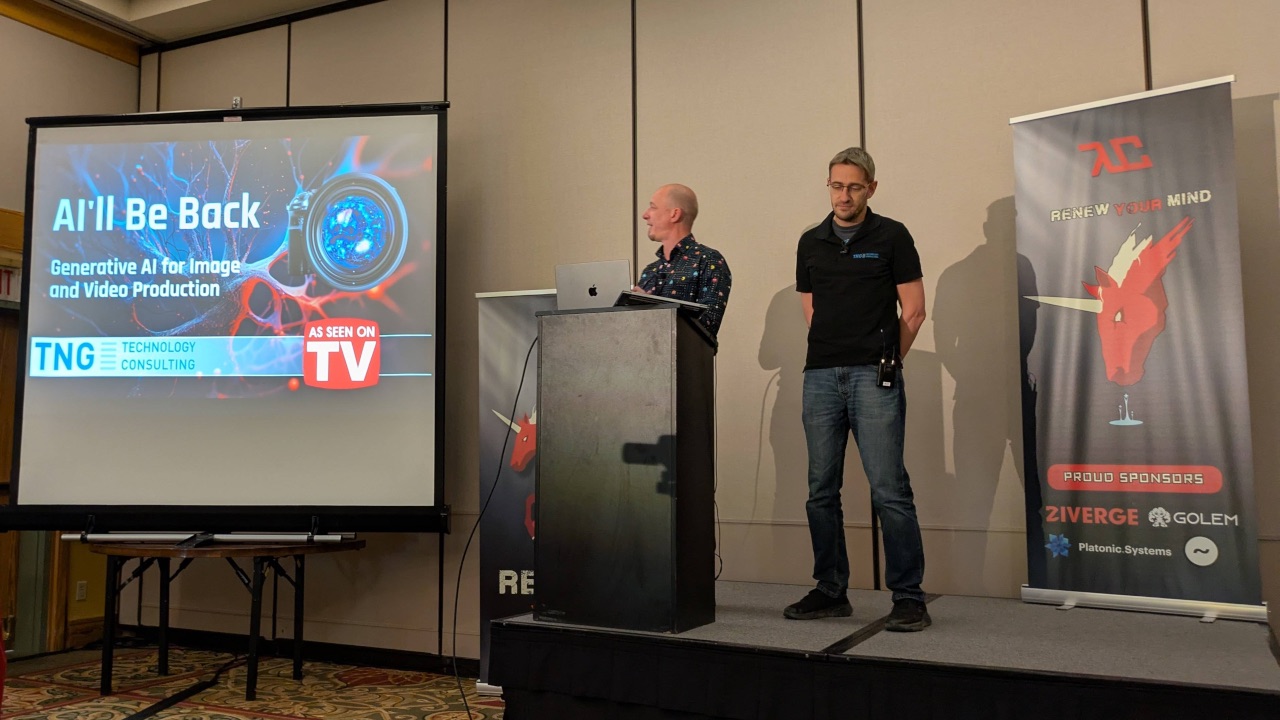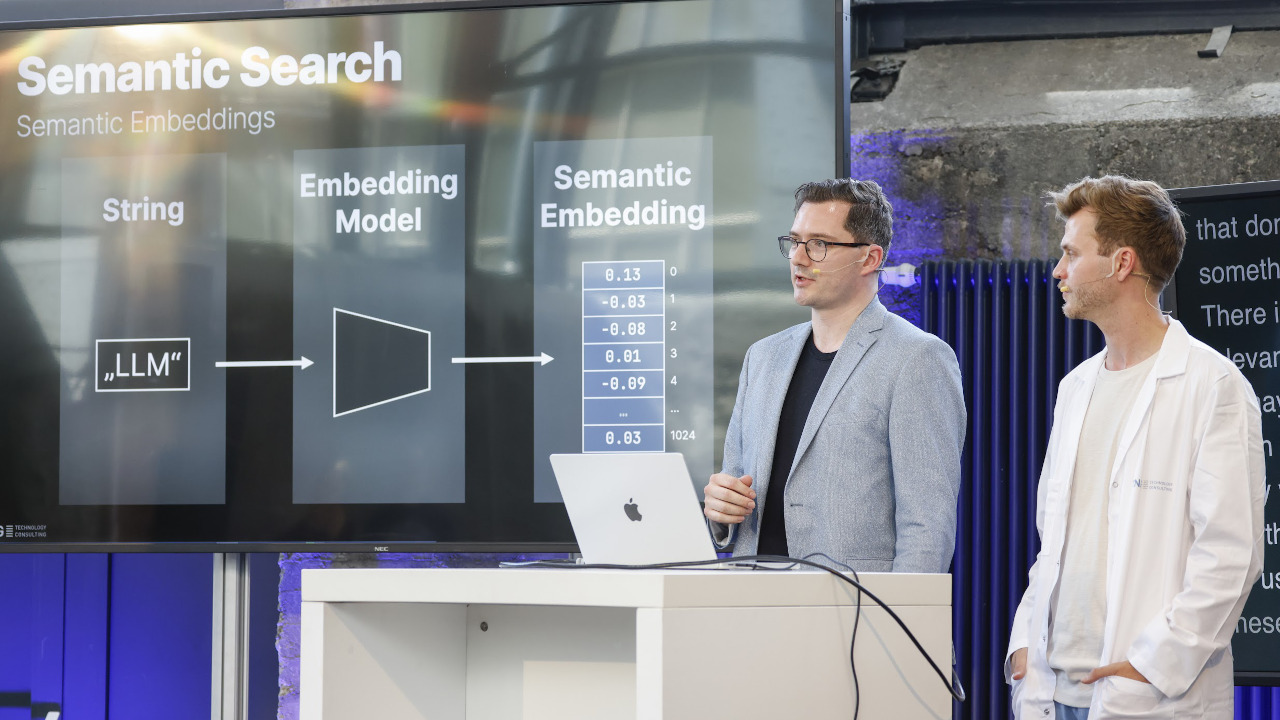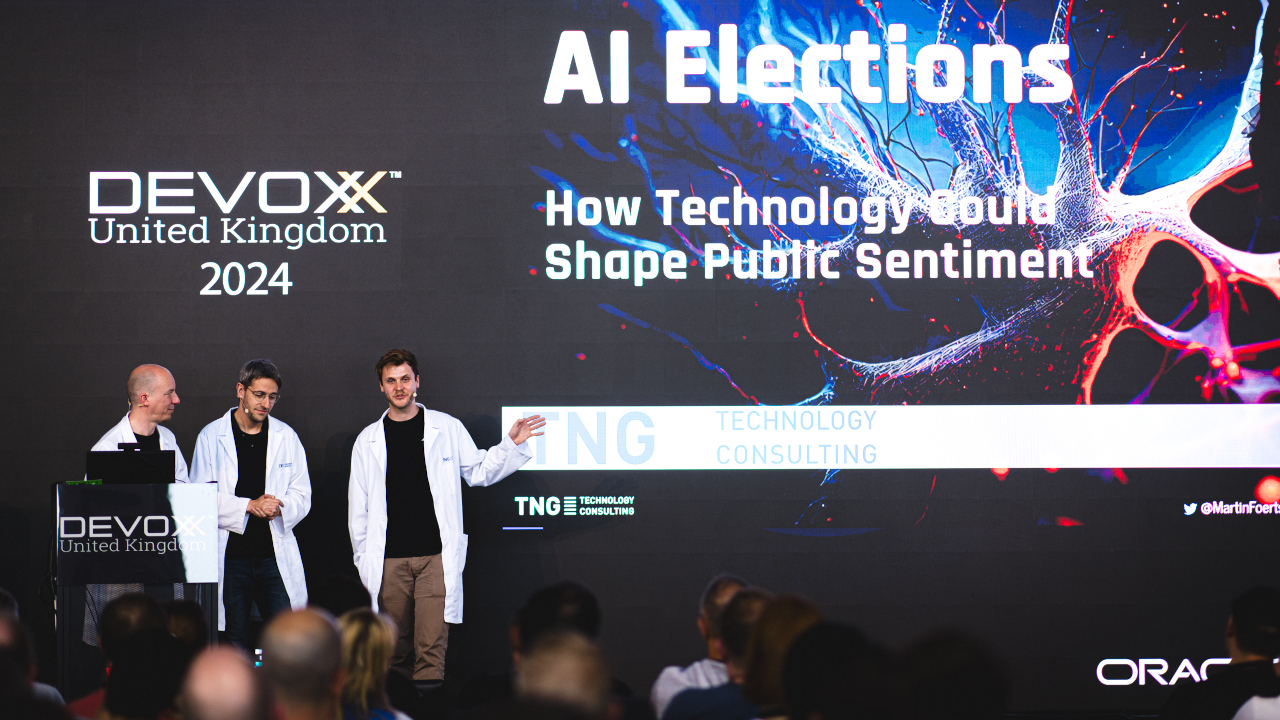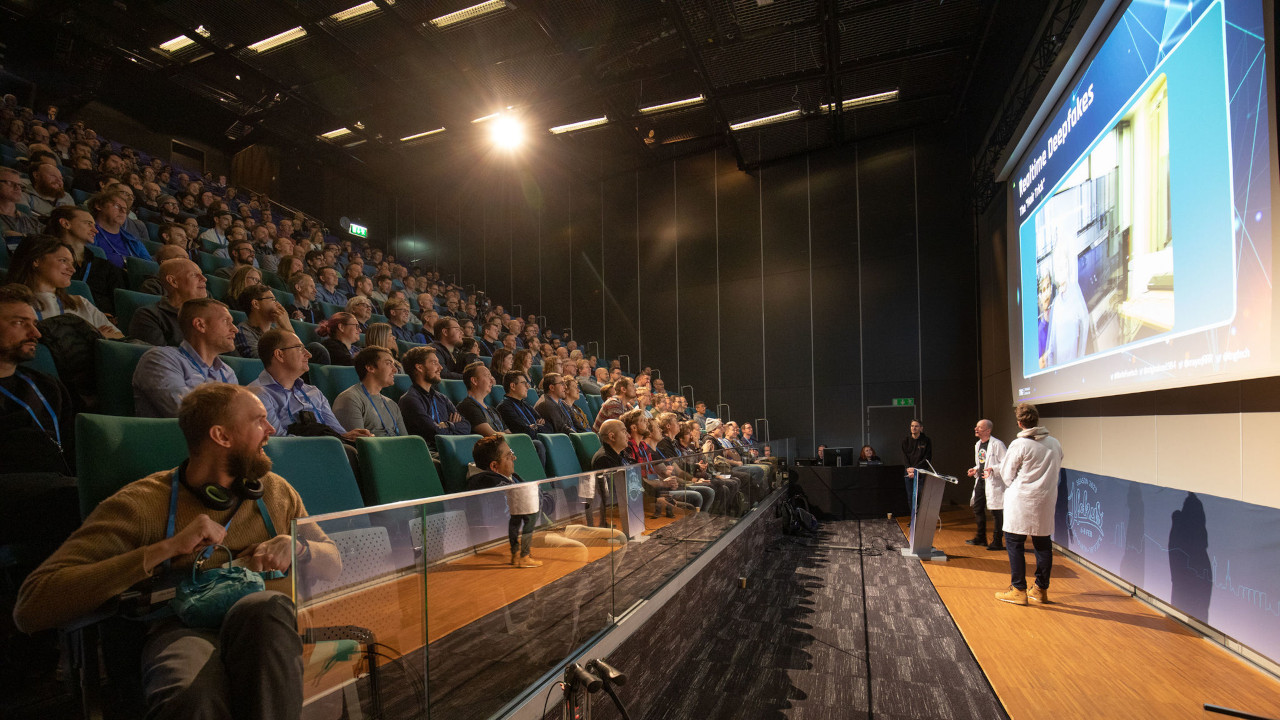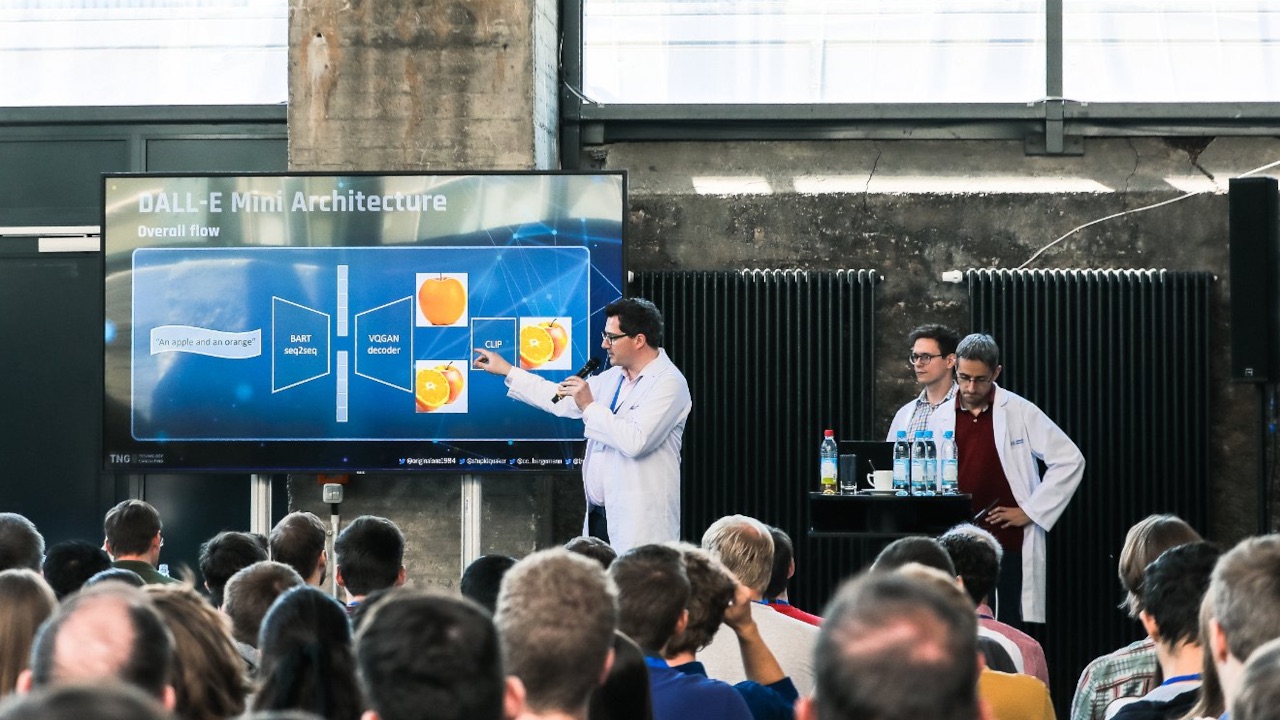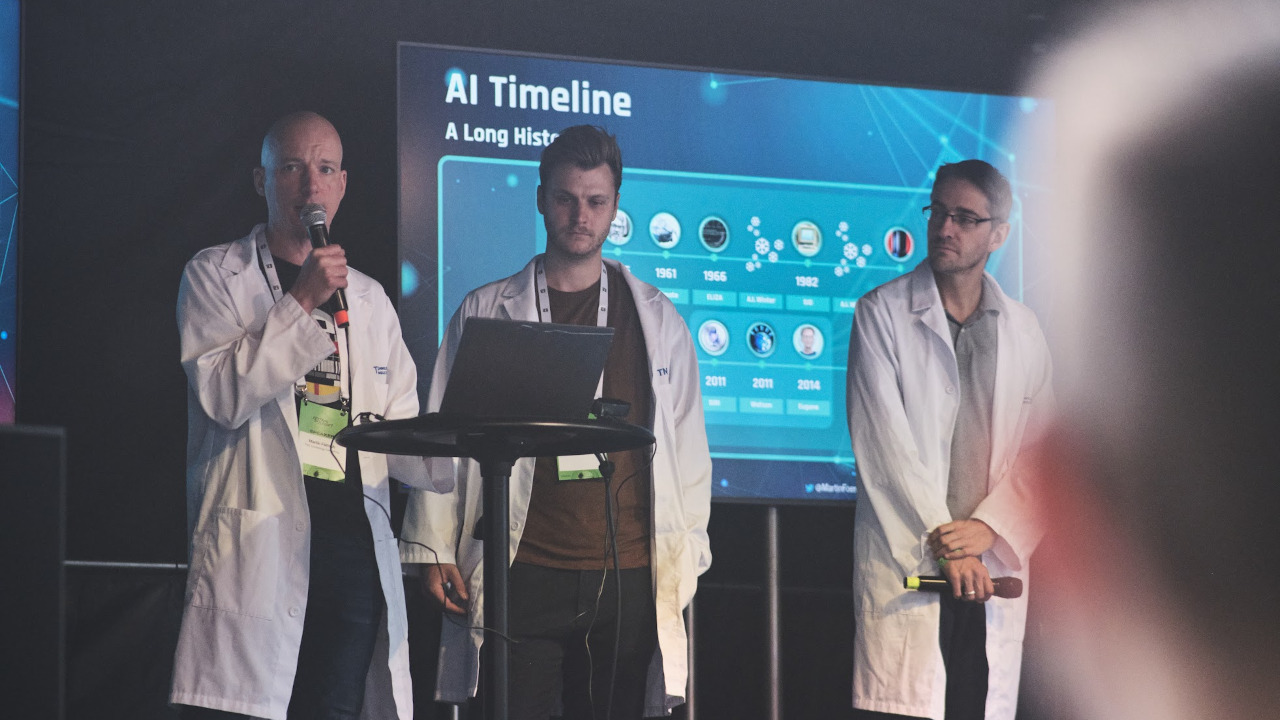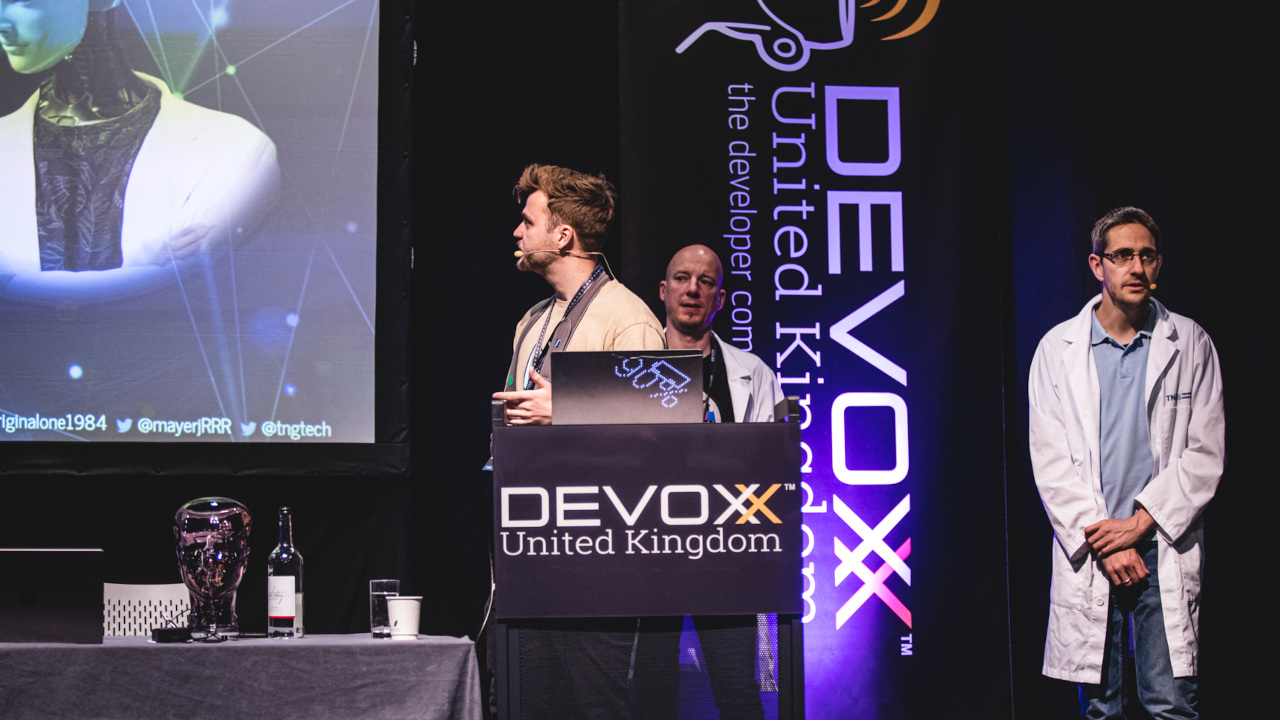What is Innovation Hacking?
Innovation Hacking is an initiative within TNG Technology Consulting. We develop showcases in hard- and software that demonstrate the value of cutting edge IT technologies since 2013. Our projects and the talks that we write about them have been presented on fairs and conferences all over the world.
Projects
Learning by doing, that's our favourite way of learning. Even more so when the doing is fun. So naturally, we created quite a few high tech showcases and demos over the years that are both fun to experience and work on. Check out a selection of our recent projects!
The Robo-Kart
A New Way of Autonomous Driving
What happens if you place a humanoid robot
in a world made for humans?Meet G1PO, TNG’s humanoid AI with eyes, purpose-built joints and the work ethics of Wall-E. It walks on its own using cameras, depth perception, and LiDAR to figure out where it is and where to go next. It has the body and skill of a human and is capable of doing many impressive tasks - like being strapped into a go-kart, turning it into one of the most over-engineered autonomous vehicles
to date. Our G1PO offers a glimpse into a future where robots learn from, work alongside and grow with us.
Realtime Deepfakes
Always be yourself. Unless you can be Jonas.
TNG’s real-time Deepfake technology makes it possible to create indistinguishable doppelgängers of a person and let them participate in video calls.Since 2019, the TNG Innovation Hacking Team has intensively researched and continuously developed the AI around real-time Deepfakes. The final product is a highly optimized pipeline
consisting of multiple computer vision
and gen-AI
models working seemlessly hand in hand.After its first appearance in 2017, Deepfakes have evolved enormously from an AI gimmick to a powerful tool for creatives. Meanwhile different media outlets such as Leschs Kosmos, Galileo and other television formats have been using TNG Deepfakes.
AI Photobooth
I'll have that photo with a side of space dinosaurs!
Lights, camera, multiverse! TNG’s AI Photobooth grabs up to three willing co‑stars, snaps clean portraits, and lets you pick the backdrop. From a Dinosaur-filled tech conference to a castle on the moon, the possibilities are endless.Then it automagically blends your faces into the scene with matching light and perspective using the power of AI. Give the preview a nod, and it spits out a glossy photo print to decorate your offices, fairs, and any lobby in dire need of a little wow.
MaRLOS
The Guardian of our Makerspace
MaRLOS (Machine-Regulated Logic Operating System) runs our Makerspace with the patience of a saint and the judgemental gaze of an all-seeing AI. Inspired by Valve’s GLaDOS from the Portal games series, it monitors the room with the patience of a saint and the judgemental gaze of an all-seeing AI. With its LLM agent system designed to detect every misplaced item and determine your fate, MaRLOS acts as both referee and informant, embodying the spirit of a vigilant overseer. Break a rule and it might gently ping you on Slack - or loudly shame you through the speakers in front of everybody. Designed to keep chaos in check, MaRLOS ensures the Makerspace remains a creative haven… provided you remember to clean up after yourself. Otherwise, MaRLOS remembers for you.
ai-slides.com
Generating slide decks is boring, let's automate that!
How good could an AI-generated PowerPoint presentation actually be? We tried it and found out: Not too shabby at all.
In the age of digitisation and AI, many tasks in our everyday lives can be automated very easily. But until recently, the everlasting torment of the average white collar, the PowerPoint presentation, had to be painstakingly created and presented by hand. But all of that ends now!
The TNG Innovation Hacking Team presents the PowerPoint Ghostwriter. Give it only the title and it automagically generates a complete slide deck, from headlines to matching images. Even the performance is taken over by artificial intelligence: a realistic deep fake avatar - trained with the knowledge of the entire Internet - takes you through the slides.
Robot Foundation Models
Do you still fold laundry yourself?
What if robots could learn valuable skills by imitating humans? We put them on copy mode and hit play. Teaching robots humanlike tasks used to result in endless programming sessions and rule sets so brittle they broke if you sneezed. Enter Robot Foundational Models: instead of coding every twitch, we show a few demos and they automagically pick it up. With only a handful of demonstration episodes, our bots fold laundry, sort M&Ms, and adapt to unexpected situations. SO101 double arms, the humanoid Unitree G1 or UR5 grippers are different devices, but can use the same architecture.CaptAIn Bookworm
MoMmY, cAn YoU rEaD mE aNoThEr BeDtImE sToRy?
CaptAIn Bookworm is your bedtime co‑author that never gets bored, runs out of breath or stuck on page two. Children’s books build empathy, creativity, and understanding - but parents know the “again, again!” loop all too well. CaptAIn Bookworm is an a AI‑powered story generator that spins personalized, heart‑warming tales starring your kid’s imaginary friends. It delivers lovingly crafted stories with matching illustrations and a natural read‑aloud - voices, pauses, and all the cozy vibes.Project Ball Magic ⚽️
Computer Vision for Football Technique Analysis
We built a Proof of Concept (PoC) for a computer vision system that evaluates football technique. Given a video of an athlete performing a training drill, the system analyses movements and ball contacts to calculate a score across different categories. This PoC shows the potential for a new class of future sports apps: fully automated video-based training companions that gamify individual training and offer a cost-effective solution for the masses.Jonas Simulator
Forget Google - Ask my Simulation
Who doesn’t like asking the same questions about our showcases over and over again? Apparently a lot of people – which is why we created the Jonas Simulator. The Jonas Simulator is a digital twin of the Head of Innovation Hacking that is forever trapped in the worlds longest digital Q&A session. Running in a 24/7 YouTube live stream, interested users can ask their wildest question about all Innovation Hacking things via live chat and the digital Jonas will answer them – if he feels like it. Under the hood, Jonas is powered by a state-of-the-art LLM running privately on TNG’s infrastructure. Via a sophisticated Retrieval Augmented Generation pipeline, Jonas has access to the vast knowledge of the Innovation Hacking Confluence about people, showcases and talks.AI LoFi Radio
Bleeding from your ears is expected
Music is constantly changing – from live music to vinyl records and all the way to LoFi HipHop live streams on YouTube. At the peak of the AI hype, the TNG Innovation Hacking Team launched an attempt to find the next logical step: An endless stream of ever-fresh LoFi music, composed and produced exclusively by algorithms and AI.
The result AI LoFi radio is a fatiguing 24/7 live stream, fed by custom software that combines different AI models with real-time music production libraries. We use Google’s MusicVAE to generate Hip Hop drums, inspired by humanly produced drum loops.Shitposting AI
Why discuss online? There's an AI for that!
Using modern AI approaches such as GPT-2, Tacotron and Conformers, we created fully autonomous robot heads that engage in heated social media discussions, completely taking the human out of the loop. The TNG Innovation Hacking Team created a prototype of an end-to-end natural language understanding system, employing techniques such as Speech-to-Text (STT), Conditional Text Generation and Text-To-Speech (TTS). Social media comments have become the predominant medium for public discussion. However, discussions on Facebook, Twitter and Reddit are notorious for their poor debate culture and missing conclusiveness. The obvious solution to this tremendous waste of time is automation of such fruitless discussions using a bot.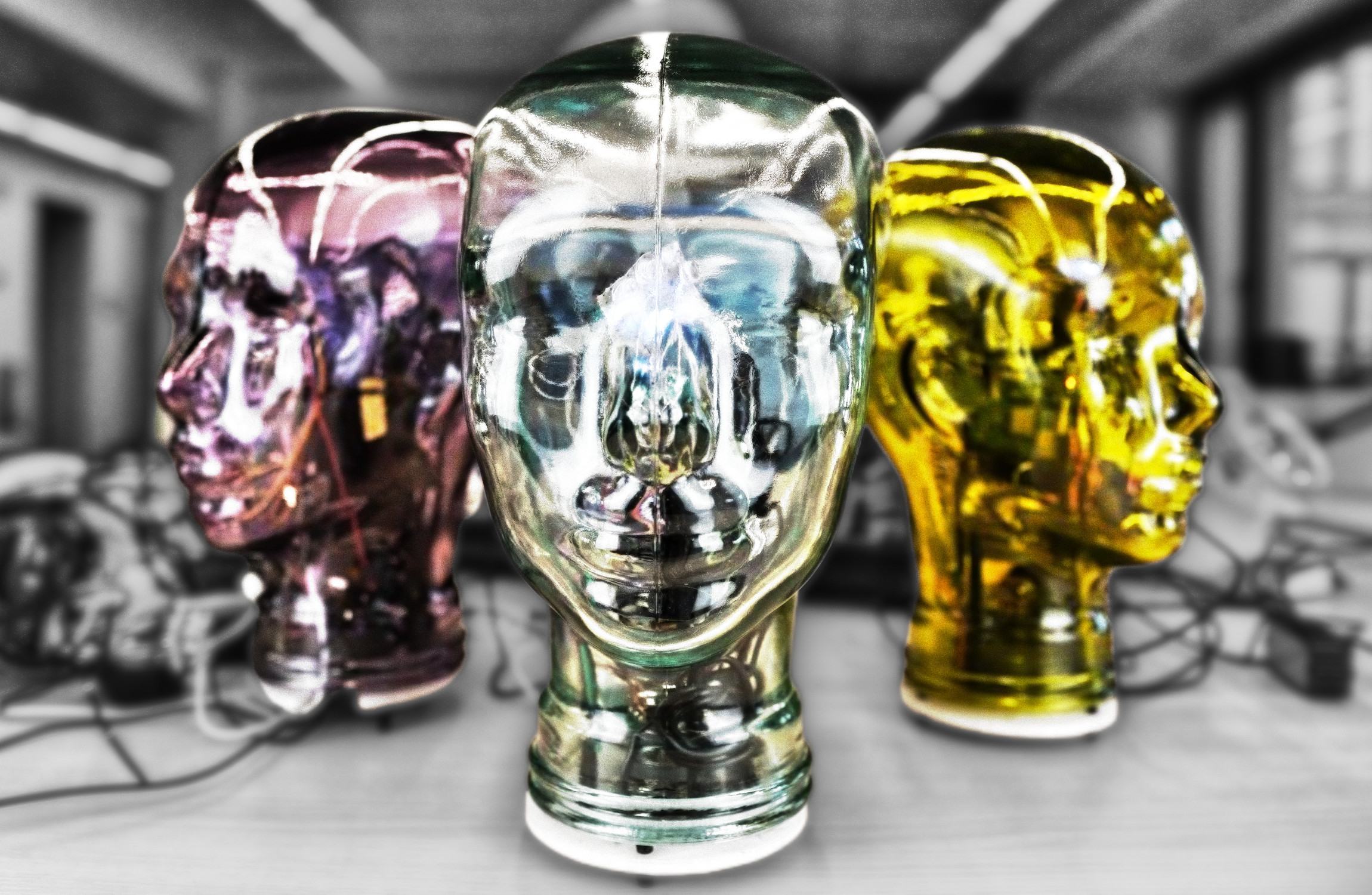
Blobby VR
Sun, Sand, and VR Jelly
Blobby VR brings beach volleyball to Meta Quest where you’re a wobbling blob and headers are your only move. It’s casual enough for a quick laugh, competitive enough to trigger a rematch, and satisfying from the first bounce. Grab a friend, queue a match, and prepare to become dangerously invested in being a very determined blob.Behind all this are months of taming network latency and physics chaos so your perfect header isn’t rocketed into low orbit. We wrangled a moody physics engine, then iterated the ball mechanics until every bop felt snappy, fair, and fun. We built it on top of the Unity game engine and tuned it through relentless playtesting.Art Vision
See the World through the Eyes of an Artist
Art Vision turns the world around you into a living, breathing painting powered by AI and Extended Reality . Under the hood, a deep neural network called Neural Style Transfer learns the look of famous artworks - or any other image - and paints it over your live view. Unity3D and a stack of GPU horsepower stylize both HTC Vive Pro camera feeds in parallel and in real time, for true stereoscopic 3D. As a result, your sofa gets swirls, your hallway gains impasto, and you step inside an artwork without setting off a single museum alarm.Talks
We don't only like to make cool stuff, we also love to talk about it! Over the years we've delivered over a dozen different flavours of talks at over a hundred events and conferences. We aim to make our talks a refreshing mix of educational and entertaining tech topics. Check out a selection of our recent conference talks!
It's All About AI 🇩🇪
Möglichkeiten und Herausforderungen von Künstlicher Intelligenz
1E9 Future Festival 2022
Want us to speak at your conference?
Our speakers would sure love to!
For further clarification, please contact us.


